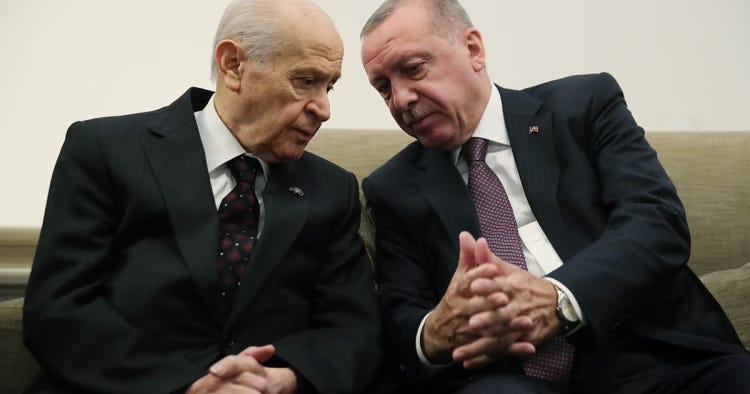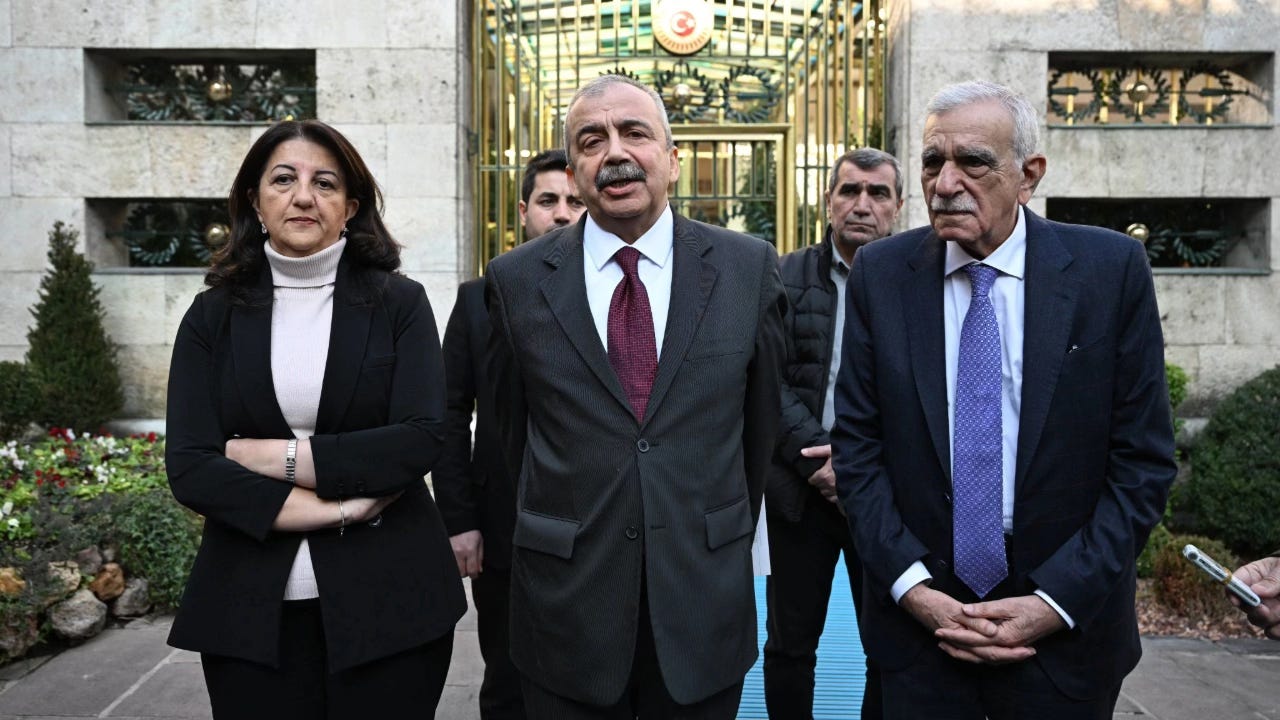What is that ‘thing’ with the Kurds in Ankara?
A century-old conflict dressed in Ankara’s transactional theatrics, where absurdity meets ambition. Meanwhile, recycled models from the Arab Uprisings find a new stage in Syria.
The whole thing is a farce—if you’re a serious person, that is. Truly. This isn’t hyperbole.
It’s not a peace process. No, it’s not a solution or conflict resolution process, as it was labeled a decade ago. And please, don’t even utter those two words: Kurdish issue. Sure, you can use the word issue but leave out Kurdish. After all, in a country where the second-most spoken language—Kurdish—is officially recorded as “an unknown language” in Parliament, leaving negotiations with the Kurdish movement and its armed wing, the PKK, without a name fits perfectly.
Consistent, even. Still, it’s a tad bit absurd.
But absurdity doesn’t necessarily mean it’s wrong to engage. At least not for me. I’ve always believed that a negotiation table, even one as flawed as this, is better than nothing. A table where the Kurdish movement sits—not just its political party but also its militia leadership in Iraq’s Qandil mountains, Syria’s Rojava, and its imprisoned leader, Abdullah Öcalan, isolated on Imrali Island in the Sea of Marmara. Better flawed than absent.
Let me simplify what’s been unfolding on this issue over the past few months. You might recall I previously wrote about a rather unexpected initiative by Turkey’s hawkish nationalist leader, Devlet Bahçeli. For five decades, his very raison d’être has revolved around denying that Kurds face problems or have rights, downplaying their persecution by the Turkish state, and vilifying the PKK—their armed wing—with such ferocity it could stretch the limits of anyone’s imagination.
Now he meets, cheerfully, with a delegation who just visited Abdullah Öcalan—whom Bahçeli alternately calls “terror chief” or “baby killer,” depending on his mood. The delegation itself bears ironies. One member, Ahmet Türk, a veteran Kurdish politician, was the mayor of the predominantly Kurdish city of Mardin until his post was confiscated by the AKP in November 2024 on charges of aiding terrorism. This marked the third time his mayorship had been revoked, prompting his cynical remark: “I’m qualified for the Guinness Records.” Another member, Sırrı Süreyya Önder, spent time in jail for his role in the 2013 peace process. Pervin Buldan, the third delegate, endured personal tragedy when her husband was executed in the 1990s during a spree of extrajudicial killings targeting Kurdish businessmen.
I’ve had the privilege of meeting all three many times over the years. Their perseverance in the face of absurdity deserves respect. The absurdity, after all, doesn’t stem from the Kurdish movement—it’s the Turkish state’s theatrics that make this “thing” so grotesque.
President Erdoğan, meanwhile, talks sparingly about this process, offering only veiled threats such as, “We have an iron fist inside a velvet glove against terrorism.” His goal is not to resolve the Kurdish issue but to control it. Let’s be clear: This is not about equal rights or self-governance in southeast Turkey. There will be no comprehensive reforms akin to Morocco’s promotion of Amazigh culture.
This is not a peace process. This is not a democratic process.
This is a transactional process.
Erdoğan’s government seeks to leverage what remains of Öcalan’s influence over Kurdish leaders in Syria to shape their actions. The aim? To coax the Kurdish SDF into cooperating with HTS, curb their aspirations for autonomy, and foster a relationship with Turkey akin to the Barzani-led Kurdish administration in northern Iraq. The driver of this transaction is Syria, but the Turkish audience gets a carrot too: the PKK ceasing violence within Turkey’s borders. Öcalan could even call for PKK disarmament, as he did at the start of the 2013 peace process—a fact conveniently forgotten.
In return? Perhaps partial freedom for Öcalan—house arrest, maybe.
Would this transaction work? Wallahi, God knows.
Öcalan still holds sway over low- and mid-level PKK/YPG members in Iraq and Syria. Mazloum Kobani, the Syrian SDF leader, is like a son to him. If both sides accept this as a transactional process, it might succeed. But this is the Middle East we’re talking about—a region where a century-old problem spans four countries: Turkey, Iraq, Syria, and Iran.
Turkey is designing Syria’s foreign visits—as it did with the Muslim Brotherhood
“We said, make your first official visit to the Saudis, don’t come to us [Turkey] first. Secure good relations with them to secure your place. He listened to us and made his first foreign visit to the Kingdom.”1
You’d think the speaker of these words is a Turkish official advising a high-ranking Syrian counterpart. You’d think this conversation took place recently.
Nope. This exchange happened between an influential AKP MP and a delegation from the Freedom and Justice Party (FJP)—the Muslim Brotherhood’s political wing—shortly after they won Egypt’s first free elections in 2012.
The AKP is dusting off its old playbook, this time for Syria’s interim government. Luckily for Ankara, Syria’s foreign minister, Mohammad al-Shaibani, is a Turkophile who completed his graduate studies in Turkey. Unlike the FJP, whose strings were pulled by the Ikhwan’s old guard, al-Shaibani is easier to influence.
Hence, al-Shaibani made his first foreign visit to Saudi Arabia. Then, on December 25, 2024, Turkish MFA Hakan Fidan met with UAE President Sheikh Mohammed bin Zayed (MBZ)—a staunch opponent of Islamist governments—in Abu Dhabi. Five days later, Erdoğan called MBZ, urging the UAE to “give HTS a chance” and not push it towards extremism. On January 6, 2025, UAE Foreign Minister Sheikh Abdullah bin Zayed met his Syrian counterpart, discussing “brotherly” ties.
Erdoğan’s goal? To secure Arab support for legitimizing an HTS-led government before Trump’s erratic administration takes office.
Former MI6 chief believes Erdoğan is the model
The AKP model is back. The West, having come to grips with Erdoğan’s authoritarianism, seems willing to look the other way. Former MI6 chief Sir John Sawers even rebranded this infamous model in a recent Financial Times op-ed: Erdoğan model!
“Erdoğan, a remarkable survivor, has built up Turkey’s power across the region and in Africa. He has shown that a philosophy of political Islam can be successful and needn’t lead to an Islamic state and strict sharia law. In that sense, he can provide a model for Ahmed al-Sharaa, leader of the HTS Islamist group that now holds power in Damascus.”
Wow. A striking recycling of a model that failed in Tunisia and Egypt after the Arab Uprisings. Let’s see if this iteration leads to a different conclusion.
Ezgi Başaran, The New Spirit of Islamism: Interactions between the AKP, Ennahda and the Muslim Brotherhood (London: I.B. Tauris/Bloomsbury, 2024), 142.






You put it all so well, but I feel so depressed afterwards!